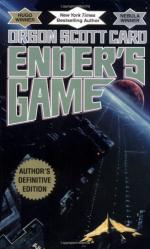|
|
Ender's Game Author/Context
Born in 1951, Orson Scott Card is a renowned science fiction and fantasy author, most notably for the science fiction book Ender's Game. Raised and still a practicing Mormon in Utah, religious themes appear in many of his books, if not explicitly. All of his books concern moral dilemmas for the central characters, and often these books involve characters discovering a higher truth which makes these dilemmas moot. The central characters are usually complex and evolving, almost never simply good or bad. Card does not limit himself to science fiction/fantasy novels - he writes regular political commentary on his website, enjoys writing short stories and was a playwright for some years of his life. He presently lives in North Carolina, with his wife and five children.
Card won two notable science fiction awards, the Hugo and Nebula, for Ender's Game, an unprecedented event. He has written three books as sequels: Speaker for the Dead, Xenocide, and Children of the Mind. These sequels are far less popular than the original book, as they deal with more adult themes and bear little resemblance to their inspiration.
Unable to leave the story alone, Card picked it back up to write a parallel set of novels describing Bean, Ender's savant underling and only confidante at Battle School. The first three books, Ender's Shadow, Shadow of the Hegemon, and Shadow Puppets have been published with a fourth, and presumably final, installment due out as of the writing of this biography.
"Ender's Game" started out in recesses of Card's mind, inspired by Isaac Asimov's Foundation series and Card's own interest in military and military training. It resurfaced years later, when Card was trying to make it a science fiction writer (but failing because he was writing fantasies instead!). An editor told him his story, "Tinker," was good, but they wanted science fiction. "Ender's Game" which first appeared as a short story/novella in an science fiction magazine, was published in 1977.
Card has noted that later on, in the early 1980's, he intended to write one book, Speaker, with Ender as its main character. Then, he realized that he needed to backfill and edit Ender's life from the short story, which became Ender's Game. As he wrote the two books (Ender's Game and Speaker for the Dead), he realized that Speaker would be too long and he needed to split it into two book. Then, as Xenocide became longer, the story split again. Speaker also won both science fiction awards (the following year), cementing Card's reputation as a dominant sci-fi writer.
Ender's Game and Ender's Shadow are currently under development as a movie, indicating the series' popularity and cultural significance.
Bibliography
Hatrack River: The Official Web Site of Orson Scott Card. http://www.hatrack.com/ Viewed 24 February 2004
Card, Orson Scott. Ender's Game. New York: Tor, 1991.
Card, Orson Scott. Speaker for the Dead. New York: Tor, 1991.
"Orson Scott Card." BrainyEncyclopedia. http://www.brainyencyclopedia.com/encyclopedia/o/or/orson_scott_card.html Viewed 24 February 2004
"Ender's Game." BrainyEncyclopedia. http://www.brainyencyclopedia.com/encyclopedia/e/en/ender_s_game.html Viewed 24 February 2004.




